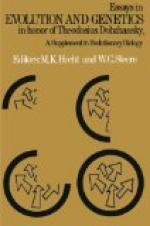|
This section contains 361 words (approx. 2 pages at 300 words per page) |
World of Scientific Discovery on Theodosius Grigorievich Dobzhansky
Dobzhansky was born in Nemirov, Russia, where his father taught mathematics. He entered the University of Kiev in 1917 and remained a steadfast student through the strife of the Russian Revolution. After his graduation in 1921, he took a position teaching zoology at the Kiev Institute of Agriculture until 1924, when he transferred to the University of Leningrad to lecture in genetics.
In 1927, he came to the United States on a fellowship to further his studies in genetics at Columbia University, where he worked with Thomas Hunt Morgan. He followed Morgan to the California Institute of Technology, where he obtained a position teaching genetics while pursuing U.S. citizenship, which he won in 1937.
That same year, Dobzhansky published Genetics and the Origin of Species, in which he coherently fused the ideas of Gregor Mendel and Charles Darwin. Since Hugo De Vries had rediscovered Mendelian genetics in 1900, geneticists had been trying to join their discipline with Darwin's evolutionary theory. At that time, scientists assumed that so-called "normal" genes dominated populations of species, and while mutations occasionally occurred, they were usually deleterious and quickly weeded out. Periodically, a beneficial mutation would serve to produce an evolutionary change. Dobzhansky, however, in his experiments with fruit flies, proved that "normal" genes did not exist. Each gene, he discovered, was capable of different degrees of variation--some more drastic than others. Mutations, therefore, were very common and provided ample material for natural selection. In 1940, Dobzhansky returned to Columbia University to accept a position as professor of zoology. He remained there for the next twenty-two years until he joined the Rockefeller Institute in 1963.
Throughout his career, Dobzhansky was keenly aware of the sociological and anthropological implications of genetics and evolutionary theory. He wrote several influential books on the subject, including Heredity, Race and Society, Mankind Evolving, and The Biology of Ultimate Concern. In these and other works, Dobzhansky strongly rejected the idea of genetically-based racial differences and cautioned that genetic research using organisms such as fruit flies could not be readily applied to human beings. He advised that the entire spectrum of cultural, biological, and environmental forces should be considered when investigating the evolution of humans. Dobzhansky died in 1975.
|
This section contains 361 words (approx. 2 pages at 300 words per page) |


